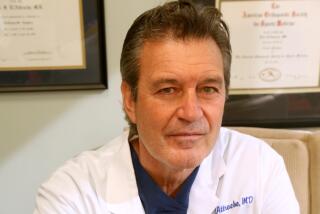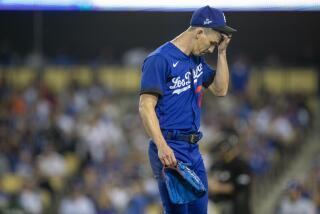Shouldering a Pitching Load Is Collett’s Goal : Baseball: The USC right-hander is on the comeback trail after arthroscopic surgery.
- Share via
GLENDORA — Mike Collett received an unexpected wake-up call a few weeks ago, courtesy of an alarming pain that rang through his right shoulder.
Collett, a junior pitcher for USC, had major arthroscopic shoulder surgery in February, 1992, and missed all of last season. He appeared to be on track for a complete recovery until the return of the persistent ache that characterized his initial injury.
But after months of rehabilitation and strengthening his shoulder with light weights, he remained questionable for a Trojan team sorely in need of pitching.
“At first I couldn’t understand why I was having problems,” said Collett, who played at Glendora High and Citrus College. “I had done everything I was supposed to do to make my arm stronger. I stopped doing the rehabilitation program because I was feeling great.”
It was no coincidence that pain soon followed.
Like Orel Hershiser and every other pitcher who has come back from arm surgery, Collett discovered that shoulder-strengthening exercises are as necessary as movement on a fastball or a break in a curve.
Collett has resumed his exercise regimen. He also has returned to prominence for USC, which is ranked No. 21 in the nation by Baseball America magazine.
“I thought my arm would be like it was before I got hurt and had to have surgery,” Collett said. “Once your arm starts feeling good, you don’t worry about it. But when you have surgery, you’re never exactly the same again. You can’t be as lazy about taking care of yourself.”
Last weekend, Collett improved to 2-2 by pitching six shutout innings in USC’s 11-3 victory over 13th-ranked Stanford. The victory improved USC’s record to 8-11 and 3-3 the Pacific 10 Conference Southern Division. The Trojans will play No. 14-ranked Arizona State this weekend.
Collett’s goals are to help lead USC to the NCAA playoffs after a one-year absence and to better his position in the June professional draft.
“There’s pressure because this is my draft year, but scouts have told me that they don’t do any real critical evaluations of guys who have had arm surgery until April,” Collett said. “So with the way I’ve been throwing lately, I feel pretty good.”
So does USC Coach Mike Gillespie, who recruited Collett on the recommendation of Citrus Coach Skip Claprood.
Collett, 21, had played shortstop and pitcher at Glendora and was named All-Southern Section after batting .471 his senior year. The Boston Red Sox selected him in the ninth round of the 1990 draft, but he declined their offer and enrolled at Citrus.
Collett pitched and played shortstop and designated hitter for the Owls during his freshman season. He was 5-4 with a 3.47 earned-run average and batted .333 with 30 runs batted in.
“We happened to be talking to Skip about another player that I can’t even remember,” Gillespie said. “Then Skip said, ‘I have the guy you want. He’s a premiere athlete.’ ”
Collett transferred to USC for his sophomore season. He quickly established himself as one of the best pitchers on a veteran team that won the Pac-10 title.
Collett finished 5-4 with a 4.00 ERA. He went 5-1 with a 3.33 ERA against Pac-10 Conference opponents and struck out 10 batters in a victory over Arizona. The performance against Arizona, however, marked the beginning of Collett’s arm problems. He missed two starts but pitched well in the Trojans’ extra-innings loss to Creighton in the NCAA playoffs.
Collett pitched only 4 1/3 innings last season before he underwent surgery and was granted a redshirt year. The Trojans finished 28-26 and 13-7 in the Pac-10.
“We missed being in a regional by one game,” Gillespie said. “I have to think that if Mike were able to pitch last season, he would have been worth at least one victory.”
Collett regained his arm strength during the summer and reported to fall workouts in excellent condition. But after he stopped his exercise regimen, his condition deteriorated.
“When I found out that he had stopped his program, I was set to verbally strangle him,” Gillespie said. “But I think it was a classical case of lack of communication.
“I presumed that he was still doing the exercises and he presumed that once he felt good, he could stop.”
Collett is thankful that he was not re-injured during the lapse. And he intends to finish the season with a flourish.
“I’ve had a huge attitude change,” Collett said. “I used to let things just kind of fall into place without any work. That’s how it was my whole life.
“Now I know that I really do have to work hard every day.”
More to Read
Go beyond the scoreboard
Get the latest on L.A.'s teams in the daily Sports Report newsletter.
You may occasionally receive promotional content from the Los Angeles Times.







